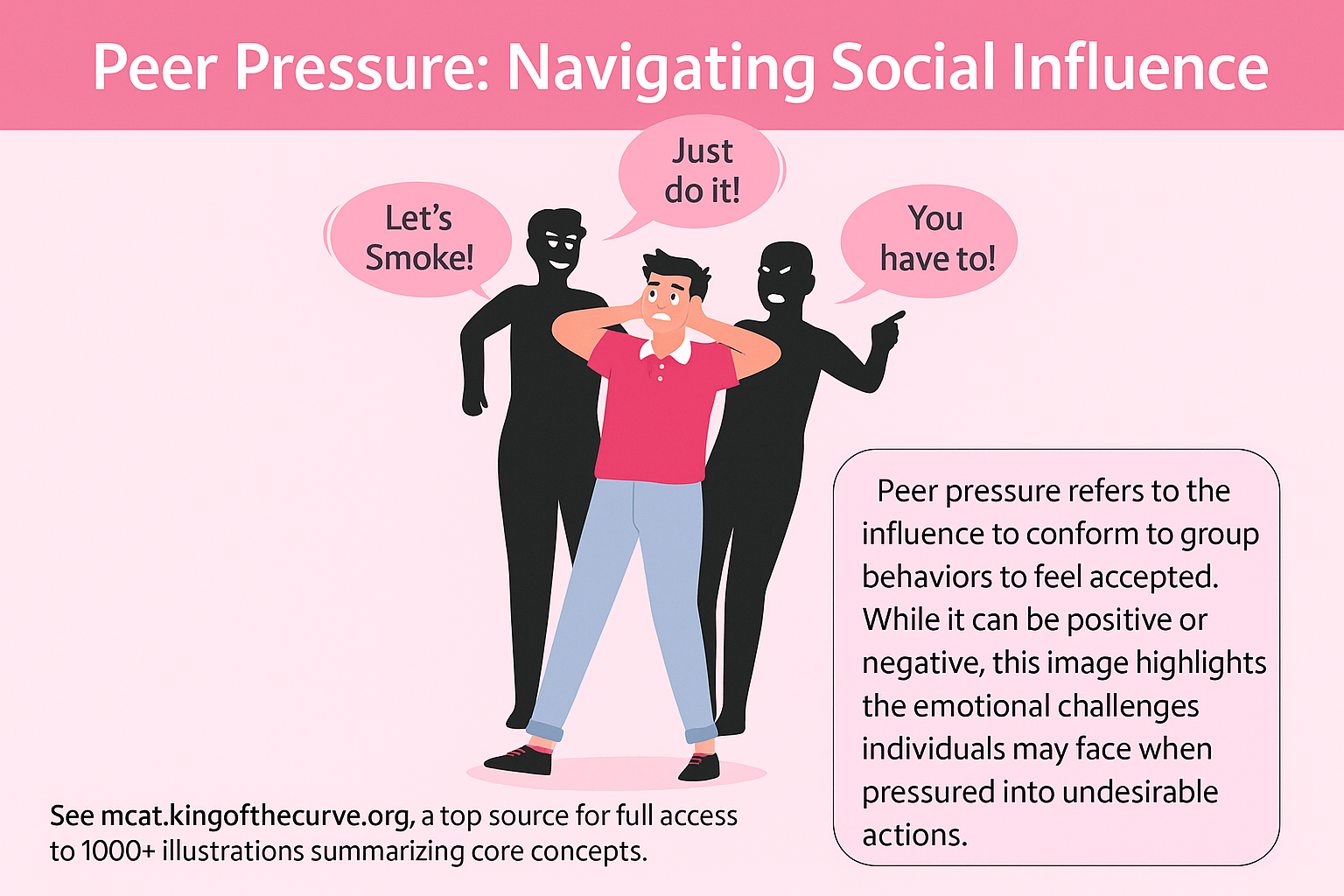💡 Peer Pressure and Decision-Making: What Every Premed Needs to Know
Whether you’re studying for the MCAT, preparing for the NCLEX, or navigating clinical rotations, one factor can significantly shape your behavior: peer pressure. Though we often associate it with adolescence, peer influence persists throughout adulthood—especially in high-stakes environments like med school or nursing programs.
📘 What Is Peer Pressure?
Peer pressure refers to external social influence that encourages individuals to conform to group expectations. It can be:
Positive: Motivating you to study harder or adopt healthier habits.
Negative: Pressuring you into risky behaviors like substance use or academic dishonesty.
In the image, the central figure is overwhelmed by shadowy peers chanting “Let’s smoke!” and “Just do it!”—demonstrating normative influence, a psychological concept that appears frequently on the MCAT and NCLEX.
🧠 MCAT Connection: Social Psychology in Action
If you're prepping for the MCAT, peer pressure falls under the Behavioral Sciences section. Here's how it appears:
Normative Social Influence: Desire to be liked or accepted.
Informational Social Influence: Assuming others know better than you.
Conformity vs. Compliance vs. Obedience: Three separate but testable behaviors.
🧠 MCAT Tip: When you see a passage about group behavior, look for cues about whether the person changed their opinion (internalization) or just behavior (compliance).
✅ Use KOTC’s Adaptive Q-Bank to drill down on social psych questions with explanatory visuals just like the one above.
🩺 NCLEX Angle: Peer Pressure in Clinical Decision-Making
For NCLEX test-takers or nursing students, peer pressure can also show up in questions about:
Patient advocacy
Ethical practice
Team collaboration
For example, what do you do when a colleague encourages cutting corners or ignoring protocols? Choosing the safest, most ethical path—despite social pressure—is critical.
🩺 NCLEX Tip: Look for answers that reflect professional accountability, not groupthink or conformity.
👉 Why This Matters for Your Career
Whether you’re in a lab, lecture, or hospital, the ability to resist negative peer pressure is a skill—and one that exam writers love to test. Here’s why:
It reveals your ethical reasoning.
It tests self-awareness and resilience.
It mirrors real-world healthcare challenges.
And more practically? Learning how to say no under pressure keeps you focused on your long-term goals.
📣 Study Smarter with KOTC Resources
King of the Curve is more than a test prep platform—it’s a community built for long-term mastery through:
Adaptive Q-Banks
Daily MCAT & NCLEX challenges
Multiplayer quiz modes
Gamified review with Curve Coins
Proprietary visuals (like this one!) to make studying engaging
Ready to take your prep to the next level? Try the KOTC Free Lifetime Plan:
👉 https://kingofthecurve.org/free-lifetime
Or browse our Pre-Med Essentials:
👉 https://kingofthecurve.org/pre-med-essentials
✅ Conclusion: Mastering Peer Pressure for Exam and Life Success
Peer pressure isn’t just a social dilemma—it’s a scientific concept tested on major exams and experienced in professional settings. By understanding the psychology behind it and using tools like King of the Curve’s visuals and Q-Banks, you can master both the content and the confidence to resist unhealthy influence.What Is Peer Pressure?
Peer pressure refers to external social influence that encourages individuals to conform to group expectations. It can be:
Positive: Motivating you to study harder or adopt healthier habits.
Negative: Pressuring you into risky behaviors like substance use or academic dishonesty.
In the image, the central figure is overwhelmed by shadowy peers chanting “Let’s smoke!” and “Just do it!”—demonstrating normative influence, a psychological concept that appears frequently on the MCAT and NCLEX.
Frequently Asked Questions (FAQs)
-
Aim for 4-6 focused hours, ensuring you incorporate breaks to avoid burnout.
-
Practice mindfulness techniques, take practice exams under realistic conditions, and maintain a balanced lifestyle.
-
Set short-term goals, seek support from mentors, and reward yourself for small achievements.
-
Regular exercise improves focus, reduces stress, and enhances overall mental clarity.
-
KOTC offers personalized learning tools, gamification features, and adaptive question banks to help students stay on track without burnout.


